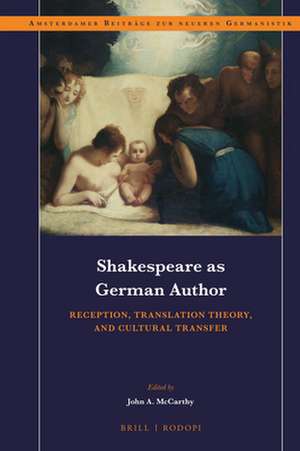Shakespeare as German Author: Reception, Translation Theory, and Cultural Transfer: Amsterdamer Beiträge zur neueren Germanistik, cartea 90
John A. McCarthyde Limba Germană Hardback – 28 mar 2018
Contributors are: Lisa Beesley, Astrid Dröse, Johanna Hörnig, Till Kinzel, John A. McCarthy, Curtis L. Maughan, Monika Nenon, Christine Nilsson.
Din seria Amsterdamer Beiträge zur neueren Germanistik
- 18%
 Preț: 805.42 lei
Preț: 805.42 lei -
 Preț: 351.83 lei
Preț: 351.83 lei -
 Preț: 202.11 lei
Preț: 202.11 lei -
 Preț: 236.65 lei
Preț: 236.65 lei -
 Preț: 410.58 lei
Preț: 410.58 lei -
 Preț: 289.39 lei
Preț: 289.39 lei -
 Preț: 236.65 lei
Preț: 236.65 lei -
 Preț: 273.72 lei
Preț: 273.72 lei -
 Preț: 306.63 lei
Preț: 306.63 lei - 18%
 Preț: 707.71 lei
Preț: 707.71 lei - 18%
 Preț: 596.91 lei
Preț: 596.91 lei - 18%
 Preț: 582.67 lei
Preț: 582.67 lei - 18%
 Preț: 676.74 lei
Preț: 676.74 lei - 15%
 Preț: 440.60 lei
Preț: 440.60 lei - 18%
 Preț: 657.25 lei
Preț: 657.25 lei - 15%
 Preț: 351.62 lei
Preț: 351.62 lei - 15%
 Preț: 404.24 lei
Preț: 404.24 lei - 18%
 Preț: 581.68 lei
Preț: 581.68 lei - 15%
 Preț: 513.96 lei
Preț: 513.96 lei - 15%
 Preț: 508.62 lei
Preț: 508.62 lei - 22%
 Preț: 575.26 lei
Preț: 575.26 lei - 18%
 Preț: 545.96 lei
Preț: 545.96 lei - 15%
 Preț: 424.75 lei
Preț: 424.75 lei - 18%
 Preț: 560.67 lei
Preț: 560.67 lei - 15%
 Preț: 472.40 lei
Preț: 472.40 lei - 53%
 Preț: 673.81 lei
Preț: 673.81 lei - 18%
 Preț: 521.28 lei
Preț: 521.28 lei - 18%
 Preț: 704.35 lei
Preț: 704.35 lei - 18%
 Preț: 645.02 lei
Preț: 645.02 lei - 18%
 Preț: 565.92 lei
Preț: 565.92 lei - 18%
 Preț: 635.13 lei
Preț: 635.13 lei - 18%
 Preț: 556.04 lei
Preț: 556.04 lei
Preț: 576.75 lei
Preț vechi: 703.36 lei
-18% Nou
Puncte Express: 865
Preț estimativ în valută:
110.36€ • 115.22$ • 91.34£
110.36€ • 115.22$ • 91.34£
Carte indisponibilă temporar
Doresc să fiu notificat când acest titlu va fi disponibil:
Se trimite...
Preluare comenzi: 021 569.72.76
Specificații
ISBN-13: 9789004361584
ISBN-10: 9004361588
Dimensiuni: 155 x 235 mm
Greutate: 0.52 kg
Editura: Brill
Colecția Brill
Seria Amsterdamer Beiträge zur neueren Germanistik
ISBN-10: 9004361588
Dimensiuni: 155 x 235 mm
Greutate: 0.52 kg
Editura: Brill
Colecția Brill
Seria Amsterdamer Beiträge zur neueren Germanistik
Cuprins
PrefaceNotes on Contributors1 The “Great Shapesphere”: German Shakespeare Reception, Cultural Transfer and Translation Theory. An IntroductionJohn A. McCarthy2 Johann Joachim Eschenburgs Shakespeare zwischen Regelpoetik und Genieästhetik Till Kinzel3 Christoph Mvartin Wielands Hamletübersetzung und ihre Bühnenwirkung: Zu Franz von Heufelds und Friedrich Ludwig Schröders Hamlet-Adaptionen Monika Nenon4 Übersetzung als Dialog: Christoph Martin Wielands Ein St. Johannis Nachts-Traum und August Wilhelm von Schlegels Der Sommernachtstraum Lisa Beesley5 Schiller zähmt Shakespeare. Der Weimarer Macbeth (1800/1801) im Licht der Kulturtranstransfer-Forschung Astrid Dröse6 Dorothea Tieck und Shakespeares Macbeth: Weibliche Aspekte des Kulturtransfers Johanna Hörnig7 Who Owns Hamlet? Gerhart Hauptmann’s Reconstruction of the Danish Prince Curtis L. Maughan8 Schändung, eine “Übermalung.” Botho Strauss’ theatralische Transformation einer Übersetzung Christine NilssonBibliography Index
Notă biografică
John A. McCarthy, Ph.D. (1972), SUNY-Buffalo, is Professor of German & Comparative Literature emeritus at Vanderbilt University (Nashville TN). He has published 15 books, most recently The Early History of Embodied Cognition (Brill, 2016), and numerous articles on European literature.
Recenzii
"The collection as a whole appears well-structured, coherent and highly informative and should thus be added to any future reading done by those interested in German Shakespeare Studies and/or German Translation Studies."
-Form for Modern Language Studies, vol. 55, iss. 2, April 2019
"[Shakespeare as German Author] is ultimately an important and new approach to Shakespeare's reception in German culture. Shakespeare's plays are viewed as a complex case of cultural transfer in which the practices of translation, adaptation, and performances are embedded...this book [is] both rewarding and comfortable for scholars."
-Peter Höyng , Emery University, in Goethe Yearbook of North America, vol. 27 (2020), pp. 374-75
"[Shakespeare as German Author] reveals the importance of early translations for the process of cultural transfer, but the chapters also chart how quickly translation becomes transformation, and the book is at its most interesting when considering the theatrical and performance contexts that move us beyond translation and towards adaptation, or even co-authorship. In doing so, the volume reveals how processes of cultural transfer not only empowered early Shakespeare reception, but continue to drive Germany’s cultural relationship with Shakespeare today." - Benedict Schofield, King's College London, in Monatshefte, vol 112, iss. 3 (2020), pp. 537-539
-Form for Modern Language Studies, vol. 55, iss. 2, April 2019
"[Shakespeare as German Author] is ultimately an important and new approach to Shakespeare's reception in German culture. Shakespeare's plays are viewed as a complex case of cultural transfer in which the practices of translation, adaptation, and performances are embedded...this book [is] both rewarding and comfortable for scholars."
-Peter Höyng , Emery University, in Goethe Yearbook of North America, vol. 27 (2020), pp. 374-75
"[Shakespeare as German Author] reveals the importance of early translations for the process of cultural transfer, but the chapters also chart how quickly translation becomes transformation, and the book is at its most interesting when considering the theatrical and performance contexts that move us beyond translation and towards adaptation, or even co-authorship. In doing so, the volume reveals how processes of cultural transfer not only empowered early Shakespeare reception, but continue to drive Germany’s cultural relationship with Shakespeare today." - Benedict Schofield, King's College London, in Monatshefte, vol 112, iss. 3 (2020), pp. 537-539
